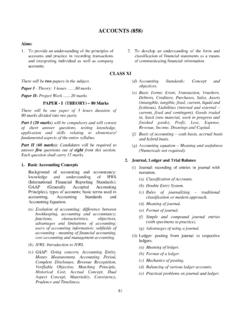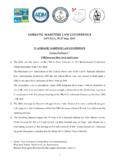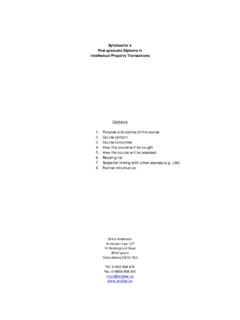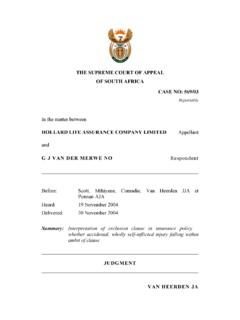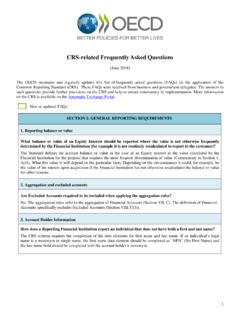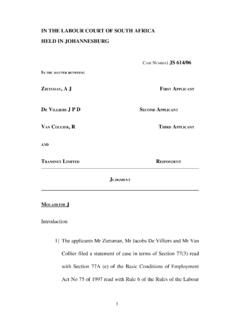Transcription of The regime of forfeiture of patrimonial benefits in …
1 85 The regime of forfeiture of patrimonial benefits in South Africa and a critical analysis of the concept of unduly benefitedMotseotsile Clement MarumoagaeLLB LLM AIPSA Dip InsolvencySupervisory Lecturer, Law Clinic, North West University (Mahikeng Campus)OPSOMMINGDie Leerstuk van die Verbeurdverklaring van Vermo nsregtelike Voordele in Suid-Afrika en n Kritiese Ontleding van die Konsep van Onbehoorlike VoordeelHierdie artikel poog om die verbeurdverklaring van vermo ensregtelikevoordele van die huwelik in die Suid-Afrikaanse reg volledig te Suid-Afrikaanse howe is gereeld genader om sulke bevele inegskeidings sake te maak vandat die Romeins-Hollandsereg in Suid-Afrikaaangeneem is. Hierdie kwessie is eers in 1979 in die Wet op Egskeidingsartikel 9(1) gereguleer. Hierdie artikel fokus spesifiek op artikel 9(1) vandie Wet en bespreek die faktore wat die howe in ag mag neem asverbeurdverklaringsbevele toegestaan word. Daar word egtergeargumenteer dat die howe gevaal het om artikel 9(1) behoorlik teinterpreter, aangesien hulle nie riglyne in verband met die betekenis van onbehoorlike voordeel (soos dit in die wetsartikel verskyn) voorsien object of this paper is not simply to narrate the law relating toforfeiture of patrimonial benefits in South Africa, but to provide an in-depth examination of this area of our family law which, in my opinion,has not been adequately covered in recent This paper isnecessary not only in academic circles, but also as a point of referencefor family law practitioners.
2 Since the adoption of the Roman-Dutch lawin South Africa, our courts have, for decades, been called upon to decidewhether or not to grant an order of forfeiture of patrimonial benefits indivorce However, the concept of forfeiture of patrimonial1 Barratt, Domingo, Mahler-Coetzee, Olivier & Denson Law of Persons and theFamily (2012); Himonga Persons and Family in F du Bois (ed) Wille'sPrinciples of South African Law (2007) 145-394; Sch fer Family Law Service(Issue 54) (October 2010) 26-27; Cockrell, Keithtley, Sinclair, Heaton, VanHeerden, Clark, Mosikatsana & Cockrell Boberg s The Law of Persons andFamily Law (1999); Cronje, Bernard & Olivier The South African Law ofPersons and Family Law (1990); Eekelaar & Nhlapo The Changing Family:Family Forms and Family Law (1998); Heaton South African Family Law(3 ed) (2010); Monareng A Simple Guide to South African Family Law (2008);Robinson, Human, Boshoff, Smith & Carnelly Introduction to South AfricanFamily Law (4 ed) (2009).
3 2 Mackarness Roman Dutch Law 1906 (1) Journal of the Society ofComparative Legislation 2014 De Jurebenefits was legislated in 1979 by the Divorce Section 9(1) of theAct provides factors to be taken into consideration by a court whengranting a forfeiture This section directs that a forfeiture ordershould be granted in circumstances where, if the order is not granted, theone party will be unduly benefited in relation to the other. However, theAct neither provides the definition of the phrase unduly benefited nordoes it clarify what is meant by this phrase in the context of the Itis even more concerning that our courts have generally failed, neglectedor refrained from explaining or interpreting what this phrase entails,despite this phrase being at the heart of section 9(1) of the purpose of this paper is to discuss section 9(1) of the Act as wellas to explain what is meant by unduly benefited in the said section. Iwill argue that in order for our courts to adequately discharge divorcematters where forfeiture of patrimonial benefits has been claimed, theremust be a clear and concise interpretation and guidance from our courtsas to what is meant by unduly benefited in the said section.
4 Eventhough I do not intend to provide a definition in this paper, I willnonetheless unpack the phrase in an attempt to understand what it spossible meaning can be. In the first part of this paper, I will brieflydiscuss the development of the South African forfeiture of patrimonialbenefits regime and demonstrate how South African courts haveapproached section 9(1) of the Act. 2 Historical Perspective 2 1 The Guilty PrincipleAt common law, marriage was to last during the lifetime of the parties;and no divorce was allowed, but by the death of one of the parties, or onaccount of preceding adultery .6 As such, divorce was based on the faultprinciple where the court had to decide the guilt or innocence of aspouse. The common law position was that the guilty spouse should notbe allowed to benefit from his or her wrong At common law, ifeither of the consorts commits adultery, he or she will forfeit thereby, for3 Act 70 of 1979 (the Act).
5 4 When a decree of divorce is granted on the ground of the irretrievablebreak-down of a marriage the court may make an order that thepatrimonial benefits of the marriage be forfeited by one party in favour ofthe other, either wholly or in part, if the court, having regard to the durationof the marriage, the circumstances which gave rise to the break-downthereof and any substantial misconduct on the part of either of the parties,is satisfied that, if the order for forfeiture is not made, the one party will inrelation to the other be unduly benefited .5S 1 of the Act only provides definitions for the following: court , divorceaction , rules , pension fund , and pension interest . 6 Van Leeuwen Commentaries on the Roman-Dutch Law (1820) 83. It is worthnoting that adultery was regarded as a crime in both Roman and Roman-Dutch law. See also Murison v Murison 1930 AD 159. regime of forfeiture of patrimonial benefits in South Africa 87the benefit of the injured party, whatever either of them would otherwisehave been entitled to by the local law or ante-nuptial contract.
6 8 De KorteJ in Mulder v Mulder,9 was called upon to decide whether the court hasthe power to make any order regarding what was brought into themarriage by the guilty party. He was of the opinion that the court has theright to declare that all property brought into the marriage by the guiltyparty shall be forfeit in favour of the other Kotze JP differed from the position adopted by De Korte J in Fergusonv Ferguson where he held that:It was held by Esselen and De Korte JJ, in the case of Mulder v Mulder .. thatproperty brought into community by a wife guilty of adultery may beforfeited in favour of her husband. Jorissen J however, dissented from thisview and thought that the guilty wife could only be declared to have forfeitedany benefits which she would have derived from her husband in consequenceof the community of property, but not also any property which she herselfbrought into the community.. There are decisions of the Dutch courts whichsupport the view taken by Jorissen J and which, with respect, I have alwaysconsidered to be the correct opinion on the subject.
7 The passage in vanLeeuwen s Commentaries, which I have already quoted, can certainly not besaid to mean that the guilty spouse forfeits everything that he or she mayhave brought into the community.. That this is so is clear from what is saidby him in ch. 37, sec. 8, where, treating of the rights of the injured spouse incase of adultery, van Leeuwen observes that the adulterer forfeits to theinjured party everything which, according to the common law or by ante-nuptial contract or otherwise, would have been acquired by him out of theproperty of his spouse. And he mentions a decision pronounced on the 19thFebruary, 1609, by the Court of Holland to that effect. This decision is alsoalluded to in Lybrechts and Kersteman (loc. cit.). So in van den Berg's , cons. 118, at p. 298, there is an opinion precisely identical withwhat is stated by van The Ferguson case referred to above, was instrumental in explainingand clarifying forfeiture jurisprudence as it is applied in South Africatoday.
8 This case in actual fact, drew a road map for practitioners and7 Quansay The order of forfeiture of benefits in divorce proceedings inBotswana: A relic of a bygone era or a ghost of the past? 2005 (1)University of Botswana LJ 120. 8 Van Leeuwen (1820) v Mulder (1885-1888) 2 SAR TS 238 (see the headnote).11(1906) 20 EDC 221. Kotz JP was further of the view that the headnote ofthis consultation erroneously states that the guilty husband forfeits all hisproperty in favour of his wife, for the opinion itself at p. 298 distinctly saysthat the guilty husband only forfeits all benefits which he would havederived from the property of his wife. Consultation 334 in vol. 1 of theDutch Consultations, and van Zutphen (Neerl. Practyck, sub voce Overspel, , p. 591), likewise agree with van Leeuwen. Nor can van der Keessel ( ) be interpreted in any other way, especially as he refers to a decision ofthe Supreme Court of Holland of the 19th February, 1743, where a wifeguilty of adultery, on a decree of divorce being granted against her, wasdeclared to have forfeited all such privileges and benefits as she mightotherwise have enjoyed from the said marriage (vide Lybrechts, loc cit.)
9 88 2014 De Jurejudicial officers of how to understand the regime of forfeiture ofpatrimonial benefits . This case was decided on the strength of Jorrisen J sminority judgment in Mulder v The essence of Jorrisen J sminority judgment was that it does not make sense for a person to bringproperty or assets into the marriage only to be told that because of his orher wrongdoing which led to the breakdown of the marriage, he or shewould lose such property or assets as a punishment for his or her effect of the Ferguson decision and the minority judgment in Mulderwas that on divorce only benefits which are derived from the marriagecan be The guilty party was allowed to keep property that heor she brought to the marriage, in that he or she only forfeited propertywhich was acquired during the subsistence of the , at common law, factors which courts took into account ondivorce when granting a forfeiture order were adultery and maliciousdesertion.
10 16 Either of the said factors, if proven, would suffice for theinnocent spouse to be granted 11 The better opinion is that laid down by van Leeuwen. The effect of thedoctrine adopted in Mulder v Mulder would be that, if a millionaire were tomarry a poor woman in community of property, he could, on a dissolutionof the marriage by reason of his adultery, be declared to have forfeited thewhole of his fortune. It seems to me that such a doctrine carries its ownrefutation with it, and I am satisfied that it is not the correct rule of law. Theopinion expressed by van Leeuwen is also that adopted in this colony, asappears from the reported cases. I need but refer to Dieperink v Dieperink(Buch. 1877, p. 92), Hasler v Hasler (13 SC 377), and McGregor v McGregor(15 CTR 114). It is a matter of daily and uniform practice in actions fordivorce, where a forfeiture is asked, to declare, on a dissolution of themarriage, that the guilty spouse has forfeited, not his or her propertybrought into the marriage, but the benefits arising from the marriage.










